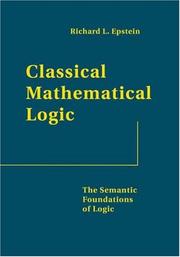| Listing 1 - 4 of 4 |
Sort by
|

ISBN: 3540097104 0387097104 3540384804 038774732X 9786611140861 1281140864 0387747338 9783540097105 Year: 1979 Volume: 759 Publisher: Berlin Springer
Abstract | Keywords | Export | Availability | Bookmark
 Loading...
Loading...Choose an application
- Reference Manager
- EndNote
- RefWorks (Direct export to RefWorks)
Complex interactions of economic, technological, political, and cultural factors have fed the rise of criminal networks worldwide. At the same time, global illegal activities depend on a world of social realities to function. Organized Crime moves beyond traditional concepts of "evil forces" corrupting their host societies, instead analyzing local, national, and international manifestations of organized crime in the situational contexts that aid in its development. The contributors provide up-to-date understanding of various aspects of organized crime, in both classic areas of research (drugs, sex trafficking, labor racketeering) and emerging areas of interest (diamond smuggling, money laundering, eco-crime), in locales as varied as Italy, Quebec, the Sinai, Bulgaria, and the world’s tropical rain forests. Topics are explored from a variety of perspectives, including sociology, criminology, political science, and anthropology, giving this book empirical breadth and depth rarely seen in the literature. A sampling of the topics: Symbolic and economic meanings of crime to cultures. The symbiotic relationships between legitimate and criminal activities. Ethical dilemmas of legitimate businesses with criminal clients. Marketing, problem-solving, recruitment: organizational models of criminal enterprises. Innovative law enforcement/administrative strategies for containing and preventing crime in the U.S. and across Europe. Scholars and researchers of organized crime as well as advanced students of criminology will welcome Organized Crime for coverage that is wide-ranging, comparative, and specific enough to match their interests.
Mathematical logic --- 517.1 --- 517.1 Introduction to analysis --- Introduction to analysis --- Lattices, Distributive --- Unsolvability (Mathematical logic) --- Lattices, Distributive. --- Unsolvability (Mathematical logic). --- Logique mathématique --- Récursivité, Théorie de la --- Décidabilité (logique mathématique)
Book
ISBN: 0195087615 Year: 1995 Publisher: New York (N.Y.): Oxford university press
Abstract | Keywords | Export | Availability | Bookmark
 Loading...
Loading...Choose an application
- Reference Manager
- EndNote
- RefWorks (Direct export to RefWorks)

ISBN: 0691123004 9780691123004 1283519283 9786613831736 1400841550 9781400841554 Year: 2011 Publisher: Princeton, N.J. : Princeton University Press,
Abstract | Keywords | Export | Availability | Bookmark
 Loading...
Loading...Choose an application
- Reference Manager
- EndNote
- RefWorks (Direct export to RefWorks)
In Classical Mathematical Logic, Richard L. Epstein relates the systems of mathematical logic to their original motivations to formalize reasoning in mathematics. The book also shows how mathematical logic can be used to formalize particular systems of mathematics. It sets out the formalization not only of arithmetic, but also of group theory, field theory, and linear orderings. These lead to the formalization of the real numbers and Euclidean plane geometry. The scope and limitations of modern logic are made clear in these formalizations. The book provides detailed explanations of all proofs and the insights behind the proofs, as well as detailed and nontrivial examples and problems. The book has more than 550 exercises. It can be used in advanced undergraduate or graduate courses and for self-study and reference. Classical Mathematical Logic presents a unified treatment of material that until now has been available only by consulting many different books and research articles, written with various notation systems and axiomatizations.
Logic, symbolic and mathematical --- Semantics (Philosophy) --- Logic, Symbolic and mathematical. --- Intension (Philosophy) --- Logical semantics --- Semantics (Logic) --- Semeiotics --- Significs --- Syntactics --- Unified science --- Language and languages --- Logic, Symbolic and mathematical --- Logical positivism --- Meaning (Psychology) --- Philosophy, Modern --- Semiotics --- Signs and symbols --- Symbolism --- Analysis (Philosophy) --- Definition (Philosophy) --- Algebra of logic --- Logic, Universal --- Mathematical logic --- Symbolic and mathematical logic --- Symbolic logic --- Mathematics --- Algebra, Abstract --- Metamathematics --- Set theory --- Syllogism --- Mathematics and statistics --- Mathematics and statistics - Textbooks
Book
ISBN: 9780387747330 9786611140861 0387747338 Year: 2008 Publisher: New York, NY : Springer New York : Imprint: Springer,
Abstract | Keywords | Export | Availability | Bookmark
 Loading...
Loading...Choose an application
- Reference Manager
- EndNote
- RefWorks (Direct export to RefWorks)
Complex interactions of economic, technological, political, and cultural factors have fed the rise of criminal networks worldwide. At the same time, global illegal activities depend on a world of social realities to function. Organized Crime moves beyond traditional concepts of "evil forces" corrupting their host societies, instead analyzing local, national, and international manifestations of organized crime in the situational contexts that aid in its development. The contributors provide up-to-date understanding of various aspects of organized crime, in both classic areas of research (drugs, sex trafficking, labor racketeering) and emerging areas of interest (diamond smuggling, money laundering, eco-crime), in locales as varied as Italy, Quebec, the Sinai, Bulgaria, and the world’s tropical rain forests. Topics are explored from a variety of perspectives, including sociology, criminology, political science, and anthropology, giving this book empirical breadth and depth rarely seen in the literature. A sampling of the topics: Symbolic and economic meanings of crime to cultures. The symbiotic relationships between legitimate and criminal activities. Ethical dilemmas of legitimate businesses with criminal clients. Marketing, problem-solving, recruitment: organizational models of criminal enterprises. Innovative law enforcement/administrative strategies for containing and preventing crime in the U.S. and across Europe. Scholars and researchers of organized crime as well as advanced students of criminology will welcome Organized Crime for coverage that is wide-ranging, comparative, and specific enough to match their interests.
Politics --- Criminology. Victimology --- politieke wetenschappen --- criminologie --- Criminology. --- Political science. --- Criminology and Criminal Justice, general. --- Political Science. --- Administration --- Civil government --- Commonwealth, The --- Government --- Political theory --- Political thought --- Science, Political --- Social sciences --- State, The --- Crime --- Criminals --- Study and teaching
| Listing 1 - 4 of 4 |
Sort by
|

 Search
Search Feedback
Feedback About
About Help
Help News
News